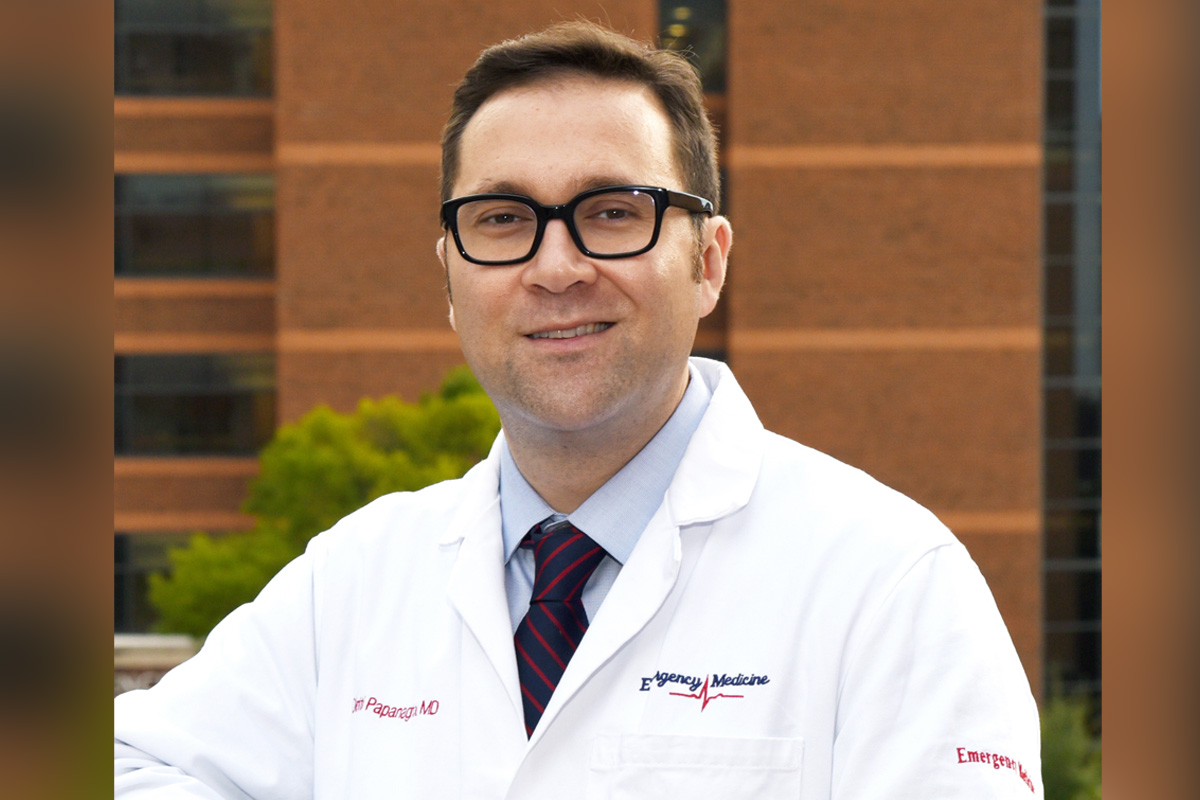As an emergency medicine (EM) physician at Philadelphia’s Thomas Jefferson University Hospital (Jefferson), Dimitri Papanagnou knows that you can’t eliminate the unexpected. But he believes that you can envision different forms it might take, create plans for responding, and — with the right tools — practice for the real thing.
Just last year, for example, Papanagnou co-authored an “Uncertainty Communication Checklist” with Kristin Rising et al, published in Academic Medicine, for use in simulation-based training and assessment of EM residents’ communication skills when — as often happens — physicians must discharge patients with conditions that have not yet been definitively diagnosed.
What kind of EM doctor has the time to think that systemically — let alone study it? Well, Papanagnou isn’t your stereotypical TV emergency room doctor, running on adrenaline and instinct. He works two other jobs — as Associate Dean for Faculty Development and Associate Professor of Emergency Medicine at the Sidney Kimmel Medical College — and he’s a doctoral student in Teachers College’s Adult Learning & Leadership program. In June, he also became the recipient of the prestigious Macy Faculty Scholars Award, provided by the Josiah Macy Jr. Foundation to fund projects that improve health by advancing the education and training of health professionals.
For his project, Papanagnou is developing a curriculum (titled Bridging Health Systems Science with Preparation for Practice: A Vertically-Integrated, Longitudinal Curriculum in Uncertainty) to help medical students and practitioners cope with the constant element of surprise in their work.
The idea is to introduce the essence of uncertainty on Day One of medical school — to help students understand that as practitioners, they will find themselves in many instances where there may not necessarily be a right answer.
—Dimitri Papanagnou
“The idea is to introduce the essence of uncertainty on Day One of medical school,” he says. “To help students understand that as practitioners, they will find themselves in many instances where there may not necessarily be a right answer.”
Papanagnou himself attended New York University School of Medicine and worked as an EM physician in hospitals in Manhattan and Brooklyn.
“Along the way,” he says, “I fell in love with theories of how to teach adults. From medical students to nursing students to post-graduate trainees, there are many inter-professional learners in the clinical environment. I wanted to turn that capricious and chaotic environment into a safe place where learners can learn.”
Papanagnou began exploring the use of simulation models, but soon found that “while there are structures in place for students and residents to learn, there really isn’t much out there to help faculty and practitioners maintain certification and credentials outside the structured world of formal education.”
It was the desire to confront that problem that eventually led Papanagnou to TC’s Adult Learning & Leadership program and its courses in higher education theory, organizational learning and organizational psychology. During his time thus far in the program, Papanagnou has collaborated with classmates on four different occasions to resolve scenarios that affect providers and patients at Jefferson.
“Dimitri is a surfer on that breaking wave, always on the go, always thinking about something new,” says Professor of Education Victoria Marsick, Adult Learning & Leadership program director. “He is an innovator who thinks on several different levels about individual work, simulation work and how to change the system.”
There are many inter-professional learners in the clinical environment. I wanted to turn that capricious and chaotic environment into a safe place where learners can learn.
—Dmitri Papanagnou
His systems thinking now also includes TC, where he helped Adult Learning & Leadership launch its Advanced Certificate for Medical Educators program and integrated this training opportunity into his medical education fellowship for the inaugural 2019-20 cohort.
“Dimitri is very passionate about fellow physicians becoming good educators,” says Senior Lecturer Jeanne Bitterman, co-coordinator of the Certificate program.
The onset of the COVID pandemic this past year has only reinforced for Papanagnou that uncertainty will remain a constant for people in his field. But he’s certain about one thing — he plans to remain in that field, continuing along the parallel tracks of clinical practice and education.
“Medicine is my window to what is going on,” he says. “My clinical experiences inform what I believe the health professions need educationally. I’m passionate about developing sustainable educational programs that will help learners thrive in a changing landscape.”
